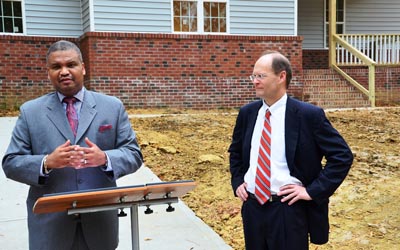 |
Home | En Español | Contact Us | A to Z |
 |
Southeast Raleigh Neighborhood Reaps Benefits of Neighborhood Stabilization Program
In spite of the possibility of inclement weather HUD Southeast Regional Administrator Ed Jennings, Jr., Raleigh Mayor Charles Meeker and City Councilman Eugene Weeks along with future Habitat for Humanity homeowner Debbie Pearce recently braved the conditions and joined other local leaders and community partners to recognize the achievements of the City of Raleigh in stabilizing the Long Arms neighborhood located in southeast Raleigh. The HUD Neighborhood Stabilization Program (NSP) grants of $2.9 million help start the turnaround in the area. Properties and lots that once sat vacant on the market for months and even years are being developed and rehabbed -- to be sold to families that have worked hard to achieve the dream of homeownership. Habitat for Humanity is refurbishing a home funded under NSP in Long Acres for Debbie Pearce, a renter for over forty years in the neighborhood. She'll soon have an energy efficient home to call her own. "What I'm here for is really to acknowledge leadership on the ground... and to highlight the success of a great city," said HUD Southeast Regional Administrator Ed Jennings Jr. "Because, when we invest in housing, it means jobs, it means stable communities, it means little kids, boys and girls, get a chance to walk out and play in neighborhoods that are safe." Jennings also announced how President Obama wants to build on in the American Jobs Act with a new "Project Rebuild." Project Rebuild he related would use the same neighborhood stabilization tools that are transforming Raleigh to help place 4000 adults and 12,700 youths in new jobs in North Carolina through the Pathways Back to Work fund proposal. It would cut the payroll tax for 170,000 of North Carolina businesses and make immediate investments that could support 10,400 jobs. Project Rebuild would further Jennings stated expand the payroll tax cut so a family in North Carolina with a median income of $42,000 will receive a tax cut of around $1,300 and prevent the layoffs of nearly 13,400 North Carolina educators and first responders. And finally help put 234,000 long-term unemployed workers in North Carolina back to work. ### |
||
| Content Archived: January 3, 2014 | ||


